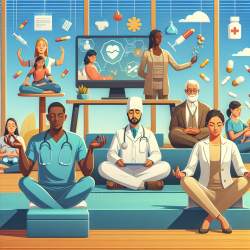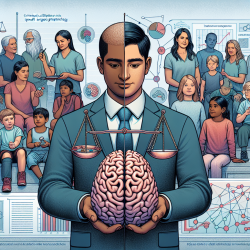Understanding the Impact of Adverse Childhood Experiences on Medical Students
Adverse Childhood Experiences (ACEs) have long been recognized as significant predictors of poor physical and mental health in adulthood. However, their prevalence and impact on specific populations, such as medical students, have not been extensively studied. A recent study titled "Adverse Childhood Experiences in Medical Students: Implications for Wellness" sheds light on this critical issue, offering valuable insights for practitioners in the field of speech-language pathology and beyond.
Key Findings from the Study
The study conducted a survey among third-year medical students, revealing that a significant number had been exposed to multiple ACEs. Specifically, 51% of students reported at least one ACE, while 12% reported four or more. Notably, those with higher ACE scores were predominantly female and reported significant impacts on their mental health.
The study also explored the relationship between ACEs and childhood protective factors (CPF), finding an inverse correlation. Students with high ACE scores tended to report fewer protective factors, highlighting the importance of resilience in mitigating the effects of childhood adversity.
Implications for Practitioners
For practitioners working with children and young adults, these findings underscore the importance of early intervention and support. Here are some practical steps that can be taken:
- Screening for ACEs: Incorporate ACE screening into routine assessments to identify at-risk individuals early.
- Building Resilience: Focus on enhancing protective factors and resilience through targeted interventions, such as cognitive-behavioral therapy and mindfulness practices.
- Trauma-Informed Care: Adopt a trauma-informed approach in therapeutic settings to better support individuals with a history of ACEs.
Encouraging Further Research
While the study provides valuable insights, it also highlights the need for further research. Future studies could explore the long-term effects of ACEs on medical students' academic performance and professional outcomes. Additionally, comparing ACE prevalence across different fields of study could provide a broader understanding of its impact.
Practitioners are encouraged to delve deeper into the topic and consider how these findings can inform their practice. By staying informed and adopting evidence-based strategies, we can improve outcomes for children and young adults facing similar challenges.
To read the original research paper, please follow this link: Adverse Childhood Experiences in Medical Students: Implications for Wellness.










